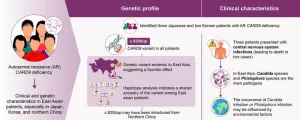(Press-News.org) Depressive symptoms are linked to subsequent memory decline in older people, while poorer memory is also linked to an increase in depressive symptoms later on, according to a new study led by researchers at UCL and Brighton and Sussex Medical School.
The study, published in JAMA Network Open, looked at 16 years of longitudinal data from 8,268 adults in England with an average age of 64.
The researchers concluded that depression and memory were closely interrelated, with both seeming to affect each other.
Senior author Dr Dorina Cadar, of the UCL Department of Behavioural Science & Health and Brighton and Sussex Medical School, said: “It is known that depression and poor memory often occur together in older people, but what comes first has been unclear.
“Our study shows that the relationship between depression and poor memory cuts both ways, with depressive symptoms preceding memory decline and memory decline linked to subsequent depressive symptoms.
“It also suggests that interventions to reduce depressive symptoms may help to slow down memory decline.”
Lead author Jiamin Yin, who graduated from UCL and is now a doctoral student at the University of Rochester, New York, said: “These findings underscore the importance of monitoring memory changes in older adults with increasing depressive symptoms to identify memory loss early and prevent further worsening of depressive function.
“Conversely, it is also critical to address depressive symptoms among those with memory decline to protect them from developing depression and memory dysfunction.”
The research team suggested that depression might affect memory due to depression-related changes in the brain. These include neurochemical imbalances (e.g. lower levels of serotonin and dopamine), structural changes in regions involved in memory processing, and disruptions to the brain’s ability to re-organise and form new connections.
The team said that memory impairments also might arise from psychological factors such as rumination – that is, repetitive thinking or dwelling on negative feelings.
On the other hand, people experiencing memory lapses or difficulties in retaining new information can lead to frustration, loss of confidence, and feelings of incompetence, which are common triggers for depressive episodes. Memory impairment may also disrupt daily functioning and social interactions, leading to social isolation potentially triggering depressive symptoms.
Dr Cadar added: “Depression can cause changes in brain structures, such as the hippocampus, which is critical for memory formation and retrieval. Chronic stress and high levels of cortisol associated with depression can damage neurons in these areas. However, a further understanding of mechanisms linking memory decline and depression is crucial for developing targeted interventions aimed at improving mood and slowing cognitive decline in individuals with depression and memory impairment.”
For this study, the researchers looked at data from the English Longitudinal Study of Ageing (ELSA), in which a nationally representative population sample in England answers a wide range of questions every two years.
People who started with higher depressive symptoms were more likely to experience faster memory decline later, while those who started with poorer memory were more likely to experience a later increase in depressive symptoms.
In addition, participants who experienced more of an increase in depressive symptoms during the study were more likely to have a steeper memory decline at the same time, and vice versa – those who had a steeper memory decline were more likely to have a sharper increase in depressive symptoms.
The same pattern was not found for verbal fluency. While less verbal fluency was linked to more depressive symptoms at the start of the study, changes in one did not predict later changes in the other.
The researchers accounted for a range of factors that might have affected the results, such as physical activity and life-limiting illness. As an observational study, the researchers noted, it could not establish causality.
The study and its authors received support from the National Institute on Aging, the Economic and Social Research Council (ESRC), the National Institute for Health and Research (NIHR), Alzheimer’s Society UK, and Alzheimer’s Research UK.
END
Depressive symptoms may hasten memory decline in older people
Depressive symptoms are linked to subsequent memory decline in older people, while poorer memory is also linked to an increase in depressive symptoms later on, according to a new study led by researchers at UCL and Brighton and Sussex Medical School.
2024-06-11
ELSE PRESS RELEASES FROM THIS DATE:
New technique could help build quantum computers of the future
2024-06-11
Quantum computers have the potential to solve complex problems in human health, drug discovery, and artificial intelligence millions of times faster than some of the world’s fastest supercomputers. A network of quantum computers could advance these discoveries even faster. But before that can happen, the computer industry will need a reliable way to string together billions of qubits – or quantum bits – with atomic precision.
Connecting qubits, however, has been challenging for the research community. Some methods form qubits by placing ...
Trash-sorting robot mimics complex human sense of touch
2024-06-11
WASHINGTON, June 11, 2024 – Today’s intelligent robots can accurately recognize many objects through vision and touch. Tactile information, obtained through sensors, along with machine learning algorithms, enables robots to identify objects previously handled.
However, sensing is often confused when presented with objects similar in size and shape, or objects unknown to the robot. Other factors restrictive to robot perception include background noise and the same type of object with different shapes and sizes.
In Applied Physics Reviews, by AIP Publishing, researchers from Tsinghua University worked to break through the difficulties ...
Shedding light on the origin of a genetic variant underlying fungal infections
2024-06-11
Researchers from Japan uncover the genetic diversity and regional patterns of CARD9 deficiency in patients susceptible to fungal diseases
Tokyo, Japan – Fungal infections pose life-threatening risks, especially when vital organs or the central nervous system are affected. Individuals harboring variants in the CARD9 gene are particularly susceptible to invasive fungal infections, given that the protein coded by this gene serves as a critical regulator of the immune system. A recent discovery ...
Humanitarian organizations showed flexibility and grit during COVID supply chain disruptions: study
2024-06-11
When the COVID-19 pandemic hit, it sent shock waves across global supply chains. But manufacturers and other businesses weren’t the only ones hit hard: local and international aid organizations, tasked with providing humanitarian assistance during times of crisis, suddenly had a major crisis of their own. How would they get the supplies they needed to carry out their crucial work?
According to a new study by the UBC Sauder School of Business, the organizations showed remarkable nimbleness and ingenuity — and while the pandemic was an unusual event, their approaches can provide powerful insights ...
Research on the visual rabbit illusion takes a leap forward
2024-06-11
Fukuoka, Japan—Researchers from Kyushu University have uncovered new variations to a traditional illusion, based on how we perceive the motion of flashing lights. Published on May 21 in i-Perception, the findings show that when three light flashes are presented in rapid succession in our side vision, our brain tends to perceive them in a straight line, with the second flash around the midpoint, no matter the actual location of the second flash. This research, which earned the journal’s Early Career Best Paper Prize this year, offers new perspectives on perceptual errors ...
Virus-like nanoparticles control the multicellular organization and reproduction of host bacteria
2024-06-11
Tsukuba, Japan—Viruses are ubiquitous in the environment, and organisms have developed various mechanisms to counter their threat. However, the genome of actinomycetes contains a highly conserved gene set encoding virus-like nanoparticles, although its biological significance has remained unclear.
In this study, researchers examined Streptomyces davawensis, an actinomycete species, and discovered that it produces virus-like particles that facilitate host reproduction. Extracellular DNA, which serves as a scaffold for multicellular organization, was significantly reduced in the colonies of mutant S. davawensis strains ...
Origins of fast radio bursts come into focus through polarized light
2024-06-11
TORONTO, ON, June 11, 2024 — What scientists previously thought about where Fast Radio Bursts (FRBs) come from is just the tip of the iceberg, according to new research led by astronomers at the University of Toronto. The mysteries of the millisecond-long cosmic explosions are unfolding with a new way of analyzing data from the Canadian Hydrogen Intensity Mapping Experiment (CHIME).
Published today in The Astrophysical Journal, the study details the properties of polarized light from 128 non-repeating FRBs — those from sources that have ...
Press registration opens for ACS Fall 2024
2024-06-11
WASHINGTON, June 11, 2024 — Journalists who register for the fall meeting of the American Chemical Society (ACS) will have access to about 10,000 presentations on topics including agriculture and food, energy and fuels, health and medicine, sustainability, and more. ACS Fall 2024 is a hybrid meeting being held virtually and in person in Denver on Aug. 18-22, with the theme “Elevating Chemistry.”
ACS considers requests for press credentials and complimentary meeting registration from reporters (staff and freelance) and public information officers at government, nonprofit and educational institutions. Please ...
New plasma escape mechanism could protect fusion vessels from excessive heat
2024-06-11
The furious exhaust heat generated by a fusing plasma in a commercial-scale reactor may not be as damaging to the vessel’s innards as once thought, according to researchers at the U.S. Department of Energy’s (DOE) Princeton Plasma Physics Laboratory (PPPL), Oak Ridge National Laboratory and the ITER Organization (ITER).
“This discovery fundamentally changes how we think about the way heat and particles travel between two critically important regions at the edge of a plasma during fusion,” said PPPL Managing Principal Research Physicist Choongseok Chang, who led ...
Endocrine Society urges passage of the Right to IVF Act
2024-06-11
WASHINGTON—The Endocrine Society endorses the Right to IVF Act, which was introduced by Senators Cory Booker (D-NJ), Patty Murray (D-WA) and Tammy Duckworth (D-IL) to protect and expand nationwide access to fertility treatment, including in vitro fertilization (IVF), and urges the Senate to pass the Right to IVF Act on June 12th to ensure that the freedom to start and grow a family is protected and accessible to everyone in the United States.
Infertility affects an increasing number of individuals. ...
LAST 30 PRESS RELEASES:
Science reveals why you can’t resist a snack – even when you’re full
Kidney cancer study finds belzutifan plus pembrolizumab post-surgery helps patients at high risk for relapse stay cancer-free longer
Alkali cation effects in electrochemical carbon dioxide reduction
Test platforms for charging wireless cars now fit on a bench
$3 million NIH grant funds national study of Medicare Advantage’s benefit expansion into social supports
Amplified Sciences achieves CAP accreditation for cutting-edge diagnostic lab
Fred Hutch announces 12 recipients of the annual Harold M. Weintraub Graduate Student Award
Native forest litter helps rebuild soil life in post-mining landscapes
Mountain soils in arid regions may emit more greenhouse gas as climate shifts, new study finds
Pairing biochar with other soil amendments could unlock stronger gains in soil health
Why do we get a skip in our step when we’re happy? Thank dopamine
UC Irvine scientists uncover cellular mechanism behind muscle repair
Platform to map living brain noninvasively takes next big step
Stress-testing the Cascadia Subduction Zone reveals variability that could impact how earthquakes spread
We may be underestimating the true carbon cost of northern wildfires
Blood test predicts which bladder cancer patients may safely skip surgery
Kennesaw State's Vijay Anand honored as National Academy of Inventors Senior Member
Recovery from whaling reveals the role of age in Humpback reproduction
Can the canny tick help prevent disease like MS and cancer?
Newcomer children show lower rates of emergency department use for non‑urgent conditions, study finds
Cognitive and neuropsychiatric function in former American football players
From trash to climate tech: rubber gloves find new life as carbon capturers materials
A step towards needed treatments for hantaviruses in new molecular map
Boys are more motivated, while girls are more compassionate?
Study identifies opposing roles for IL6 and IL6R in long-term mortality
AI accurately spots medical disorder from privacy-conscious hand images
Transient Pauli blocking for broadband ultrafast optical switching
Political polarization can spur CO2 emissions, stymie climate action
Researchers develop new strategy for improving inverted perovskite solar cells
Yes! The role of YAP and CTGF as potential therapeutic targets for preventing severe liver disease
[Press-News.org] Depressive symptoms may hasten memory decline in older peopleDepressive symptoms are linked to subsequent memory decline in older people, while poorer memory is also linked to an increase in depressive symptoms later on, according to a new study led by researchers at UCL and Brighton and Sussex Medical School.





